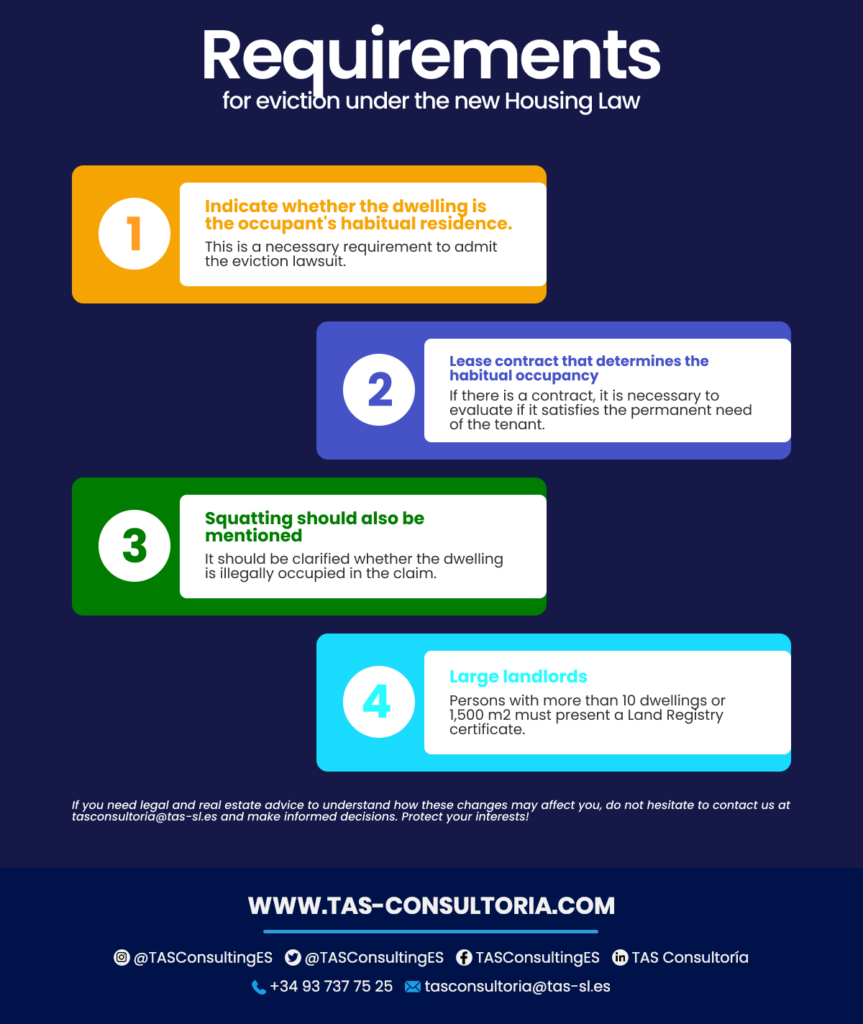
In Spain, the act of “evicting” has undergone significant changes with the recent enactment of the new Housing Law. These modifications have a direct impact on both landlords and tenants, altering the process for carrying out an evicting. Read on and discover the key aspects, let’s go!
What is the main change in the eviction process under the new Housing Law?
The Plenary of Congress has approved the Housing Law. It imposes several measures, including limits on rental price increases throughout Spain. It also reduces the classification of “major landlord” from ten to five properties in certain cases. In addition, landlords will be required to go through conciliation or arbitration before evicting vulnerable people.
The new “large tenant” classification makes it more difficult to evict tenants if the landlord meets this criterion. This provision has been the main reason for the opposition’s criticism of the law. Thus, evictions will not be able to be carried out without a predetermined time and date.
One of the main objectives of the law is to protect vulnerable people from having their rent evicted. The courts will have to request a report from social services to verify whether a person is in a vulnerable situation.
If their vulnerability is confirmed, the eviction will be suspended until the Administration finds alternative housing. All this for a period of two months if the claimant is a natural person. And it will be four months if it is a legal person.
You may also be interested in: Hiring a real estate agency: what should you know?
What are the requirements for the act of evicting a tenant?
The process of evicting a tenant is a complex matter regulated by law. In order to carry out an eviction legally, a series of requirements and procedures established by current legislation must be complied with.
Below, we share with you the updated measurements:

You should know that, when filing a lawsuit to evict a tenant, it is crucial to mention whether the dwelling in question is the occupant’s habitual residence. This is a necessary requirement for the lawsuit to be admitted. Depending on the existence or absence of a contract, this information can be easily determined.
Also, if there is a contract, it will be assessed whether the dwelling is the tenant’s habitual dwelling for eviction. That is to say, if the contract was established to satisfy his permanent housing need. Otherwise, as in seasonal or tourist leases, it is considered that it is not the habitual dwelling.
In case of squatting, the above information may not be known. However, it is important to point it out in the claim.
Also, take into account what happens if the claimant is a large fork.
What exactly does the term “large fork” mean?
It is a person (natural or legal) who owns more than 10 urban dwellings for residential use. Or a plot of land of more than 1,500 m² (not including storage rooms or garages).
If you have this profile to be evicted, you must prove your condition. In addition, you must present a certificate from the Land Registry that verifies your properties.
It is important to note that in areas with high demand or stressed areas this term will be valid. Individuals or companies with five or more homes in that municipality also fall into the category of large holders. On the other hand, those who have less than five dwellings in their property are classified as small holders.
When does the new Housing Law come into force regarding evictions?
It is essential to take into account the approved periods for eviction actions. These statements are applicable for eviction actions filed after May 25, 2023.
This is the date on which the new law came into force, regardless of whether the eviction is for precariousness. That is, for lack of contract, illegal occupation, expiration of term or non-payment of rents. It is essential to comply with the requirements for the eviction lawsuit to be valid under the new legislation.
You may also be interested in: Learn about the new housing price forecast 2023
More requirements for the large fork in the act of eviction
Landlords considered “large tenants” now face increased requirements and responsibilities when evicting a tenant. Understand how this legal change could affect you with these factors:
Vulnerability
- You must indicate if the occupants are in a situation of economic vulnerability.
- Provide documents from social services or a documented responsible statement in order to evict your tenant.
Mediation
- You have to undergo a mediation process with tenants or occupants.
- You must have the mediation services document or responsible statement.
Suspension due to vulnerability
- If the occupant is economically vulnerable, the eviction process may be suspended.
- Social services are the ones that determine vulnerability by income vs. rent + supplies.
- You have up to 2 months (if the owner is a natural person). Or 4 months (legal person) for the eviction process to be suspended.
- The administrations of each region may offer subsidies or social rental housing.
You may also be interested in: What is the new Insolvency Law about?
The new Housing Law has brought significant changes to the process of evicting a tenant in Spain. It is essential to understand these modifications in order to protect the rights of both landlords and tenants.
If you are facing an eviction situation and need legal advice to make the right decisions, do not hesitate to contact us. You only have to schedule your personalized advice through tasconsultoria@tas-sl.es. Don’t wait any longer, contact us right now and ensure your peace of mind and well-being!




Your email address will not be published .
Required fields are marked with *